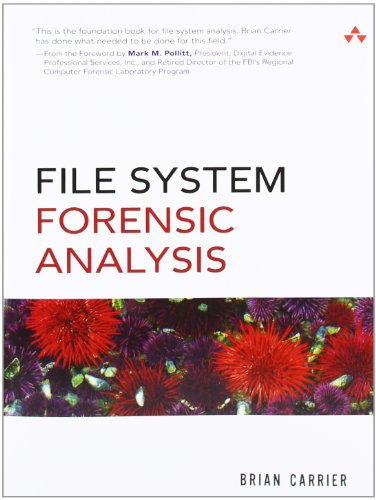File System Forensic Analysis ebook
Par perkins beverly le dimanche, septembre 25 2016, 02:46 - Lien permanent
File System Forensic Analysis. Brian Carrier

File.System.Forensic.Analysis.pdf
ISBN: 0321268172,9780321268174 | 600 pages | 15 Mb

File System Forensic Analysis Brian Carrier
Publisher: Addison-Wesley Professional
Autopsy automates many of the tasks required during a digital forensic analysis using the TASK collection of powerful command line tools as a foundation. Here's a starter list: File System Forensic Analysis, Brian Carrier. This chapter breaks down a file's content and metadata. I'm pretty sure this dude dreams in binary. The author of the " Sleuth Kit " is Brian Carrier which happens to also be the author of a wonderful book called "File System Forensic Analysis" that is a must read for any serious file system analyst. File System Forensics by Brian Carrier. Most digital forensics evidence is stored within the computer's file system, but working with file systems is the most technically challenging aspect of forensic analysis. This week, we have a wealth of File System information, new and old, updates to the popular and versatile RegRipper program, and some very promising research in the area of memory forensics. Our goal is to get the community access to our research as quickly as possible! File system tunneling is a somewhat obscure feature of Windows that some examiners may not be familiar with. File Systems Forensic Analysis. Digital Forensics with Open Source Tools: Using Open Source Platform Tools for Performing Computer Forensics on Target Systems: Windows, Mac, Linux, Unix, 4) Chapter 8 on File Analysis is the longest chapter (41 pages in length), covering analysis of image files, audio and video files, archive files, and documents. The key to forensics is freezing the environment as close to the point of compromise as possible. August 10, 2012 lovejeet Leave a comment Go to comments. Computer Forensics, Computer Forensics and Forensic Science, Internet Forensic,Computer Crime Scene Investigaions,File System Forensic Analysis. I was asked to speak on the topic of “Linux Filesystems”, and I have chosen to focus on the ext2 and ext3 filesystem data structures.